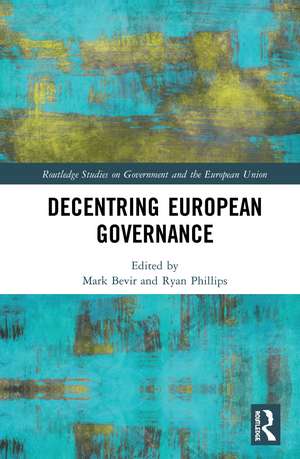Decentring European Governance: Routledge Studies on Government and the European Union
Editat de Mark Bevir, Ryan Phillipsen Limba Engleză Hardback – 28 feb 2019
The book offers an analysis of the formation and transformation of the EU as an example of governance above the nation-state and is framed by the recognition that the construction of the EU has resulted in variegated and decentred forms of governance. The chapters look at distinct aspects of EU governance to bring to light the influence of elite narratives, scientific rationalities, local traditions and meaningful practices in the making and remaking of European governance. As such, each chapter offers a unique contribution to the study of the EU. In doing so, the book challenges dominant narratives of European integration and policymaking that appeal to reified rationalities and social structures, and uncovers the contingency and conflict endemic to European governance.
This text will be of key interest to scholars and students of European Union politics, European politics/studies, governance and, more broadly, to public management, international organizations, anthropology and sociology.
Din seria Routledge Studies on Government and the European Union
-
 Preț: 326.49 lei
Preț: 326.49 lei -
 Preț: 290.42 lei
Preț: 290.42 lei -
 Preț: 416.22 lei
Preț: 416.22 lei -
 Preț: 414.32 lei
Preț: 414.32 lei -
 Preț: 462.43 lei
Preț: 462.43 lei -
 Preț: 405.66 lei
Preț: 405.66 lei - 13%
 Preț: 297.57 lei
Preț: 297.57 lei -
 Preț: 416.22 lei
Preț: 416.22 lei -
 Preț: 389.38 lei
Preț: 389.38 lei - 25%
 Preț: 126.62 lei
Preț: 126.62 lei -
 Preț: 382.95 lei
Preț: 382.95 lei - 16%
 Preț: 273.05 lei
Preț: 273.05 lei -
 Preț: 383.93 lei
Preț: 383.93 lei -
 Preț: 396.73 lei
Preț: 396.73 lei -
 Preț: 415.24 lei
Preț: 415.24 lei - 17%
 Preț: 256.85 lei
Preț: 256.85 lei - 18%
 Preț: 949.47 lei
Preț: 949.47 lei - 9%
 Preț: 936.17 lei
Preț: 936.17 lei
Preț: 1000.27 lei
Preț vechi: 1219.84 lei
-18% Nou
Puncte Express: 1500
Preț estimativ în valută:
191.46€ • 208.04$ • 160.93£
191.46€ • 208.04$ • 160.93£
Carte tipărită la comandă
Livrare economică 21 aprilie-05 mai
Preluare comenzi: 021 569.72.76
Specificații
ISBN-13: 9780815381815
ISBN-10: 0815381816
Pagini: 224
Ilustrații: 4 Line drawings, black and white; 6 Tables, black and white; 4 Illustrations, black and white
Dimensiuni: 156 x 234 x 14 mm
Greutate: 0.45 kg
Ediția:1
Editura: Taylor & Francis
Colecția Routledge
Seria Routledge Studies on Government and the European Union
Locul publicării:Oxford, United Kingdom
ISBN-10: 0815381816
Pagini: 224
Ilustrații: 4 Line drawings, black and white; 6 Tables, black and white; 4 Illustrations, black and white
Dimensiuni: 156 x 234 x 14 mm
Greutate: 0.45 kg
Ediția:1
Editura: Taylor & Francis
Colecția Routledge
Seria Routledge Studies on Government and the European Union
Locul publicării:Oxford, United Kingdom
Public țintă
Postgraduate and UndergraduateCuprins
1. Introduction: Decentring European Governance [Mark Bevir and Ryan Phillips] 2. Calories, Tractors & ‘Technical Agriculture’: Manufacturing Agrarian Cooperation within the OEEC (1947-1954) [William Biebuyck] 3. The EU’s International Cultural Strategy [Caterina Carta] 4. Participatory Processes as Unreliable Narrators: Political Legitimacy and Governance Narratives in the Social OMC Peer Review Process [Dion Curry] 5. Decentring European Higher Education Governance: The Construction of Expertise in the Bologna Process [Dorota Dakowska] 6. The Governance of Expertise Production in the EU Commission’s ‘high level groups’: Tracing Expertisation Tendencies in the Expert Group System [Eva Krick and Åse Gornitzka] 7. A Genealogy of Eurozone Governance [Nicolas Jabko] 8. EU Council Networks and the "Tradition" of Consensus [Jeffrey Lewis] 9. Decentred Governance in the EU’s Security and Development Policies [Ludvig Norman] 10. Decentring European Governance: A Research Agenda [Mark Bevir and Ryan Phillips]
Notă biografică
Mark Bevir is a professor in the Department of Political Science, and Director of the Center for British Studies, at the University of California, Berkeley, USA.
Ryan Phillips is an assistant professor of Political Science at Lycoming College, USA.
Ryan Phillips is an assistant professor of Political Science at Lycoming College, USA.
Descriere
The book offers an analysis of the formation and transformation of the EU as an example of governance above the nation-state and is framed by the recognition that the construction of the EU has resulted in variegated and decentred forms of governance.
